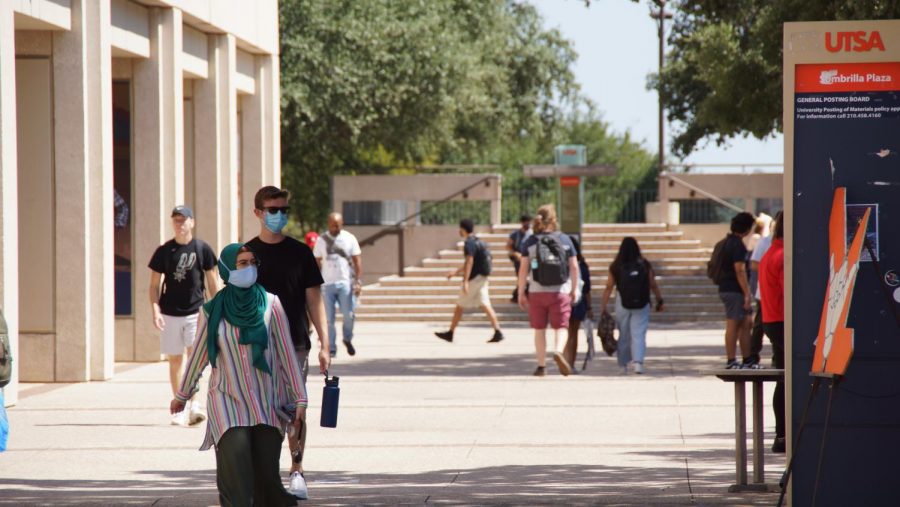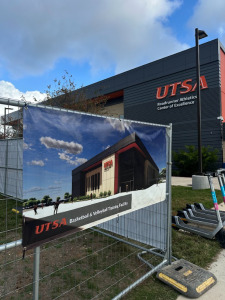UTSA modifies operations for first three weeks of Spring 2022 semester
Description- UTSA campus switches to online class modalities for first three weeks of Spring 2022 semester.
January 18, 2022
UTSA announced its modified operations for the Spring 2022 semester in an email dated Thursday, Jan. 6. The email, signed by President Taylor Eighmy, Provost and Senior Vice President for Academic Affairs Kimberly Andrews Espy, and Chief Financial Officer and Senior Vice President for Business Affairs Veronica Salazar Mendez, stated that UTSA will be conducting the first three weeks of the Spring 2022 semester online.
“As COVID-19 cases continue to surge locally and we prepare for the upcoming semester, we wanted to update you on short-term adjustments we will be making to keep our Roadrunner community safe. As always, we are committed to putting the health and safety of our entire campus community first. To uphold that commitment, we will begin the spring semester virtually with most scheduled classes meeting online for three weeks, from January 18 through February 6,” the email stated.
Most classes will be conducted online for the first three weeks of the Spring 2022 semester, with the exception of classes that require “hands-on instruction.” Following the first three weeks, the university plans on shifting back to in-person classes and activities. This will be the second consecutive semester where the university temporarily changes class modalities.
The decision comes amid growing concerns over the spread of the new Omicron variant, which, as data suggests, is more transmissible than previous variants. The variant has become dominant locally and continues to spread through San Antonio and Bexar County, elevating the local risk level to severe.
The university cited this change in risk level, as well as a rise in positivity rates and hospitalizations in San Antonio, as its rationale in updating the Spring 2022 operations.
“As we shared last week, we’ve been closely monitoring the COVID-19 Omicron variant surge locally, statewide and across the globe to make informed decisions. Pandemic models, like the IHME model, indicate this surge will peak in Texas later this month and then begin to diminish in February. Several factors can change the model’s outputs, but like our use of it last fall, it remains a good forecasting tool for us,” the email explained.
SGA President Jose Escobedo — who was one of the people consulted during the decision-making process — said that being virtual for the first three weeks of the semester would give the university, as well as students, enough time to plan and prepare for the spring semester.
“I did consider the experiences from last semester and how that went. And you know, I think the result was that we had a relatively controlled…semester. I don’t think we have [had] a major outbreak … I also just thought of it as a standalone scenario. And if you think about it logically, giving us these three weeks to prepare ourselves is the best [way] to do it [from] a public health standpoint,” Escobedo said.
“At the end of the day, this pandemic and this virus is still something we’re trying to get a handle on. I don’t think we’ve completely understood what we’re dealing with yet,” Escobedo added.
Apart from operational changes, the university also outlined its testing policy, which includes mandatory testing for any students, staff or faculty that have had a high-risk exposure or show symptoms of COVID-19. All test results must be reported via the university’s COVID-19 Case Report.
“Mandatory testing remains critical to facilitating the UTSA COVID Response Team’s efforts to effectively manage the risk of transmission and help reduce the spread of COVID-19 among the Roadrunner community,” the university’s announcement explained.
Despite the change in teaching activities, a lot of on-campus services, including the UTSA Libraries, Student Union, Campus Rec and Rowdy Campus Store, will be open to students with “reduced density and enhanced cleaning and safety protocols.” The university has also limited on-campus indoor events to 50 participants or 50% of the venue capacity, depending on which number is smaller; however, virtual operations are preferred.
As the university continues to monitor the trajectory of the variant locally and statewide, the email further emphasized the importance of getting vaccinated, wearing masks and taking necessary precautions.
“Roadrunners, we know this pandemic continues to weigh heavily on our community. The last two years have been challenging for our entire community, but especially for those impacted by serious illness and the loss of loved ones. We will keep you updated as conditions evolve,” the email concluded.Additional information and important updates can be found on the university’s Roadrunner Map.







